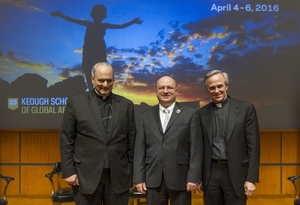 Rev. John I. Jenkins, C.S.C., president (right), with panelists Most Rev. Marcelo Sánchez Sorondo (left) and Scott Appleby, dean of the Keough School, before the inaugural conference “For the Planet and the Poor”
Rev. John I. Jenkins, C.S.C., president (right), with panelists Most Rev. Marcelo Sánchez Sorondo (left) and Scott Appleby, dean of the Keough School, before the inaugural conference “For the Planet and the Poor”
Bishop Marcelo Sánchez Sorondo, chancellor of the Pontifical Academy of Sciences and the Pontifical Academy of Social Sciences, spoke on the keynote panel of the For the Planet and the Poor conference Monday evening (April 4) in the Jordan Auditorium of the University of Notre Dame’s Mendoza College of Business.
The conference, organized by Notre Dame’s new Keough School of Global Affairs, has brought together thinkers from the worlds of development policy and practice, government, the Church and other religious bodies to discuss and reflect on the implications of Pope Francis’ encyclical on the environment, Laudato Si’: On Care for Our Common Home and the United Nations’ Sustainable Development Goals, which were approved by world leaders last September.
Bishop Sorondo said that the encyclical represented “a new approach, a new appreciation of the doctrine of the Church, regarding creation. All things are created by God and also oriented toward God, going to God.”
Bishop Sorondo particularly cited the discussion in Laudato Si’ of the climate as a common good “belonging to all and meant for all,” and of climate change as a consequence of human activity and a threat to the poorest and most vulnerable humans. He said that “the motivation” of the encyclical is the Beatitudes, which will be “the protocol of the last judgment.”
A native of Buenos Aires, Argentina, Bishop Sorondo was ordained a priest in the Buenos Aires archdiocese in 1968 and a bishop in Rome in 2001. From 1976 to 1998 he taught the history of philosophy at the Pontifical Lateran University in Rome before being appointed chancellor by Pope Saint John Paul II.
“We can say that we now have a ‘magic moment,’” Bishop Sorondo said. “Because for the first time and perhaps the last time, the speech of the Church and the speech of the world as represented by the United Nations have some synergy, and for people who believe, for people like me, this comes from the Holy Spirit.”
Joining Bishop Sorondo on the keynote panel were R. Scott Appleby, Marilyn Keough Dean of the Keough School of Global Affairs; A. Atiq Rahman, executive director of the Bangladesh Centre for Advanced Studies; Jeffrey D. Sachs, director of the Earth Institute and Quetelet Professor of Sustainable Development at Columbia University; and Sara Sievers, associate dean for policy and practice of the Keough School of Global Affairs.